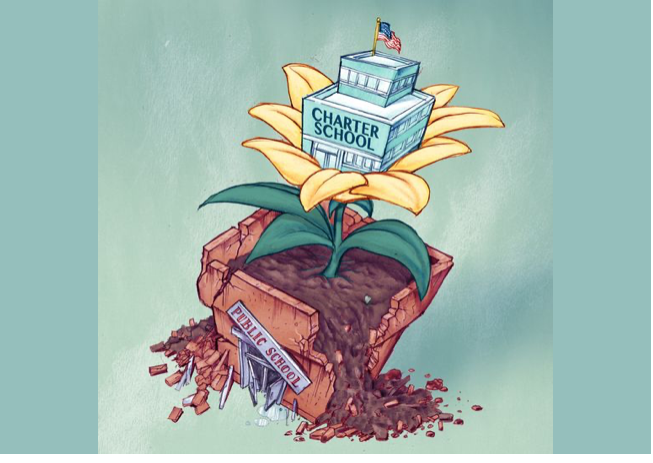CommentsCOMMENTARY - American public education is broken. Since the pandemic began, students have experienced severe learning loss because schools remained closed in 2020—
and even in 2021 when vaccinations were available to teachers and it was clear schools could reopen safely. Many schools also failed to administer remote learning adequately.
Before the pandemic, about two-thirds of U.S. students weren’t reading at grade level, and the trend has been getting worse. Results from the National Assessment of Educational Progress, commonly known as the nation’s report card, show that in 2019, eighth-grade math scores had already fallen significantly.
Teachers understand the severity of the problem, and many are doing heroic work, yet some of their union representatives are denying reality. “There is no such thing as learning loss,” said Cecily Myart-Cruz, head of the Los Angeles teachers union, in an interview with Los Angeles Magazine this past summer. “Our kids didn’t lose anything. It’s OK that our babies may not have learned all their times tables. They learned resilience.”
What nonsense. How about reading, writing and arithmetic, the critical skills we are funding schools to teach?
Instead of giving students the skills they need to succeed in college or in a trade, the public education system is handing them diplomas that say more about their attendance record than their academic achievement. This harms students, especially those from low-income families. When and if they graduate, they will try to find work in an economy that values knowledge and skills above all else, and their old schools will say to them: “Good luck!”
Other nations are rising to this challenge and racing ahead, but we are moving backward, creating an economic and national-security crisis that will worsen over time. Unless we have the courage to rebuild public education from the bottom up, we will continue to doom our most vulnerable to a life of poverty and, in too many cases, incarceration.
We know what works, because we can see it in real time. Success Academy’s network of 47 public charter schools is serving New York children whose families predominantly live below the poverty line. Their students are outperforming public-school students in Scarsdale, N.Y.—the wealthiest town on the East Coast and the second-wealthiest town in America—by significant margins. Yet a statewide cap on charter schools is blocking Success Academy from expanding.
In New York and many other places, enrollment in traditional schools has fallen dramatically since the start of the pandemic as parents search for better alternatives. Meanwhile, across the country, charters saw their largest enrollment increase ever last year—240,000 more children.
Charters, which generally don’t operate under union contracts, also have more flexibility to manage staffing, curriculum, testing and compensation. This allows them to create a culture of accountability for student progress week to week that many traditional public schools are missing. As Ms. Myart-Cruz said, “You can recall the governor. You can recall the school board. But how are you going to recall me?”
Ironically, she’s right. And as school failures worsen, children are paying a terrible price for this lack of accountability. A union’s job is to represent its members, not to set education policy. They can have input, but schools should focus on the needs of students first, not the employees. It’s the job of elected officials to make that clear and not cater to their political supporters and campaign donors.
During my time as mayor of New York, I worked closely with Randi Weingarten, now president of the American Federation of Teachers. While we often disagreed, we were able to raise base pay for teachers by 43% in exchange for a longer school day. Our administration also worked with the state Legislature to raise the cap on charter schools, and over 12 years, we helped create more than 150 new charters, many of which have performed at the highest levels. These schools have helped reduce racial and ethnic achievement gaps in New York.
Today there are long waiting lists for charter schools across the country, but mayors and governors aren’t getting the support they need from Congress and the White House to open new charter schools. To begin meeting the demand for charters, Bloomberg Philanthropies is launching a five-year, $750 million effort to create seats for 150,000 more children in 20 metro areas across the country.
We will provide seed capital to open new, high-quality charter schools with leadership and staff members that reflect students’ diversity. This investment will also help existing charter schools grow. We will also fund work to strengthen schools’ data systems, train and develop principals and teachers, and study what is working well to develop best practices for the nation.
This initiative builds on the education work our foundation has been doing for years, including programs that train teenagers for trades and other fields that offer well-paid, stable careers that are not easily automated or moved overseas.
It also builds on our financial-aid support to Johns Hopkins University, which has made the school’s admissions process permanently need-blind. The idea behind the Hopkins gift is the same one driving this new charter-school initiative: There should be no connection between family income or skin color and a student’s opportunity to receive a great education—not in college, and not in elementary, middle or high school either.
We need a new, stronger model of public education that is based on evidence, centered on children, and built around achievement, excellence and accountability for all. The future of America’s most vulnerable children—and of our country—is riding on whether we can deliver it.
(Mr. Bloomberg, founder of Bloomberg LP, served as mayor of New York, 2001-13.)






